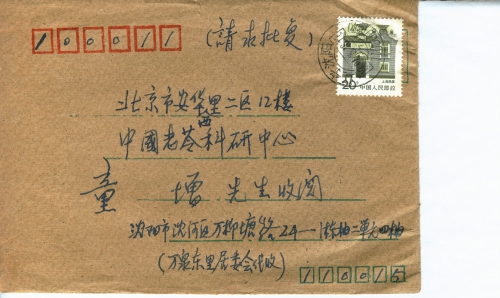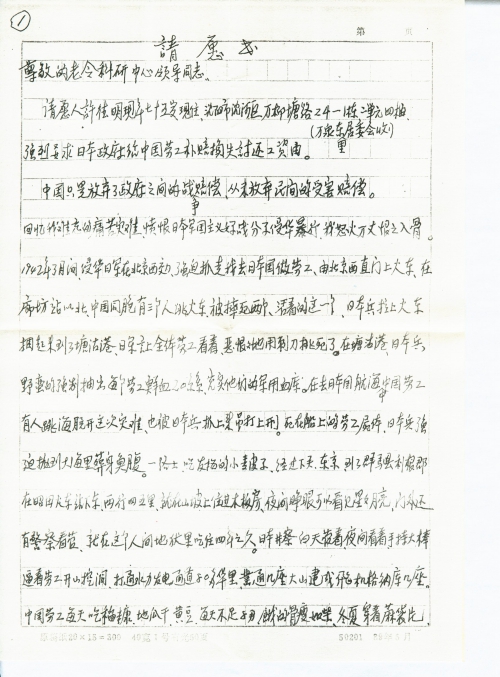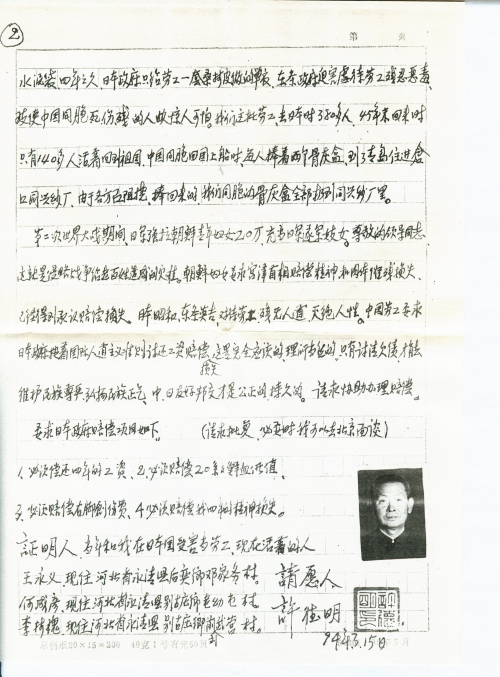Date of letter:1994-03-15
Address of author:Shenyang City, Liaoning Province
Date of event:1942-03
Location of event:Beijing
Name of author:Xu Deming
Name(s) of victim(s):Xu Deming
Type of atrocity:Slave Laborers, Murders(SL, MU)
Other details:In 1943 I was arrested in the west suburbs of Beijing and forced into labor work in Japan. On the way, three fellows jumped off the train, two of which were dead. The one alive was stabbed to death by Japanese in front of us. Those who tried to escape but failed on the way were cruelly killed. In Tanggu, the Japanese soldiers forced to draw blood from each worker to supply for their military blood bank. When we worked as a Slave Laborers in Japan, we had rice chaff, dried sweet potatoes and soybeans for food. We barely had enough to eat every day and everyone was skinny. No winter coat was provided for us. So more than 380 workers were sent to Japan and only 140 people were able to make it back. During World War II, the Japanese forced 200,000 Korean women into sexual slavery among other crimes they committed. For that the Japanese must compensate us victims. We strongly urge the Japanese government to compensate in accordance with the listed items.
Petition
Respected officer comrades of the China Research Center on Aging:
Petitioner Xu Jiaming, now 75, currently residing at 4F, Unit 2, Building 24-1, Wanliutang Road, Shenhe District, Shenyang (c/a Wanquandongli Residents Committee) strongly demands the Japanese government to compensate for loss of Chinese laborers and pay salary.
China only abandoned war compensation between governments; it has never given up civilian damage compensation.
When reminiscing my unforgettable disastrous tragedy, I would bitterly resent the invasion and atrocities committed by the Japanese soldiers. The bitter memory leads me into uncontrolled rage. In March 1942, I was captured by the invading Japanese Army in the western suburb of Beijing and many of us were forced me to go to Japan and to work as laborers. We boarded train at Beijing Xizhimen, north of Langfang Station, three Chinese compatriots jumped train, two of them died, one was alive but was pulled back onto the train and tied up by the Japanese soldiers until we arrived at Tanggu Port, where the Japanese Army asked all laborers to watch and stabbed him to death with bayonet. At Tanggu Port, the Japanese soldiers savagely extracted 20 L of blood from every laborer to replenish their military blood bank. During the sea journey to Japan, some Chinese laborers jumped the ship in order to extricate themselves from this tragedy, when captured they were hung and tortured by the Japanese soldiers. For laborers who died on the ship, the Japanese soldiers threw their bodies into the sea to feed fish. Along the way, we ate mildewed wheat dough sheets. After passing Shimonoseki and Tokyo, we arrived at Tone County, Gunma Prefecture, and got off the train at Shoda Railway Station. We then walked 4-5 li to the west, to live in wood board houses on the slope. We lived under the stars and the moon, with the Japanese guard stood outside. We lived like hell this way for as long as four years. Japanese police monitored us day and night, and they brandished sticks to force laborers to dig caves in the mountain, and excavated a pathway for hydraulic power station for more than 80 li, excavated through several mountains to build several aircraft hangars. Chinese laborers each day ate rice, dried sweet potato, and soybean. The ration was less than 400 grams per day, that starved us to skin and bone. Our clothes were made from bags used to carry grain and vegetables. We had the same clothes in summer and winter for as long as four years. The Japanese government only gave each laborer a suit of unlined clothing made of mulberry tree bark. The Tokyo government persecuted and maltreated laborers in cruel and malicious ways, which resulted in an appalling number of dead, injured and disabled Chinese compatriots. There were originally more than 380 laborers in our group batch, in 1945 when we returned only 140 plus persons returned to the motherland alive. When Chinese compatriots boarded the ship bound for China, each held two cinerary caskets. Ehen arriving at Qingdao we lived in Cangkou Tongxing Cotton Mill Factory, due to intervention from all sides, all the cinerary caskets of our compatriots we took back were left at the Tonigxing Cotton Mill Factory.
During the WWII period, the Japanese Army forced 200,000 Korean young women to work for the Japanese Army as military prostitute. Respected official comrades, this is the disaster brought by the invasion war to the common people. Korean women demanded Prime Minister Miyazawa to compensate for mental and physical damages and losses, which have been acknowledged. The Japanese Showa Emperor and Hideki Tojo treated laborers in barbaric and inhuman manner. Chinese laborers demand the Japanese government to follow the principle of international humanitarianism to pay back salary and compensate for loss, which is fully justified and reasonable. Only by demanding repayment of debt can we uphold national dignity, carry forward national spirit, the Sino-Japan friendly diplomatic relationship will be fair and enduring. I demand you to assist the compensation claim.
Items for compensation by the Japanese government are as follows:
(Reply is requested, if necessary I can go to Beijing for interview)
1. Must compensate for four years of salary;
2. Must compensate for the value of 20L blood;
3. Must compensate for left foot injury expense;
4. Must compensate for four years of mental damage fee.

Testifier: Former laborers forced to go to Japan in those years like myself who are now still alive
Wang Yongyi, currently residing at Dengjiawu Village, Houyi Town, Yongqing County, Hebei Province.
He Chengyan, currently residing at Laoyoutun Village, Birgu Town, Yongqing County, Hebei Province.
Li Linhuai, currently residing at Qianliuwuying Village, Bieguzhuang Town, Yongqing Town, Hebei Province.
Petitioner
Xu Deming (name seal)
March 15, 1994
















